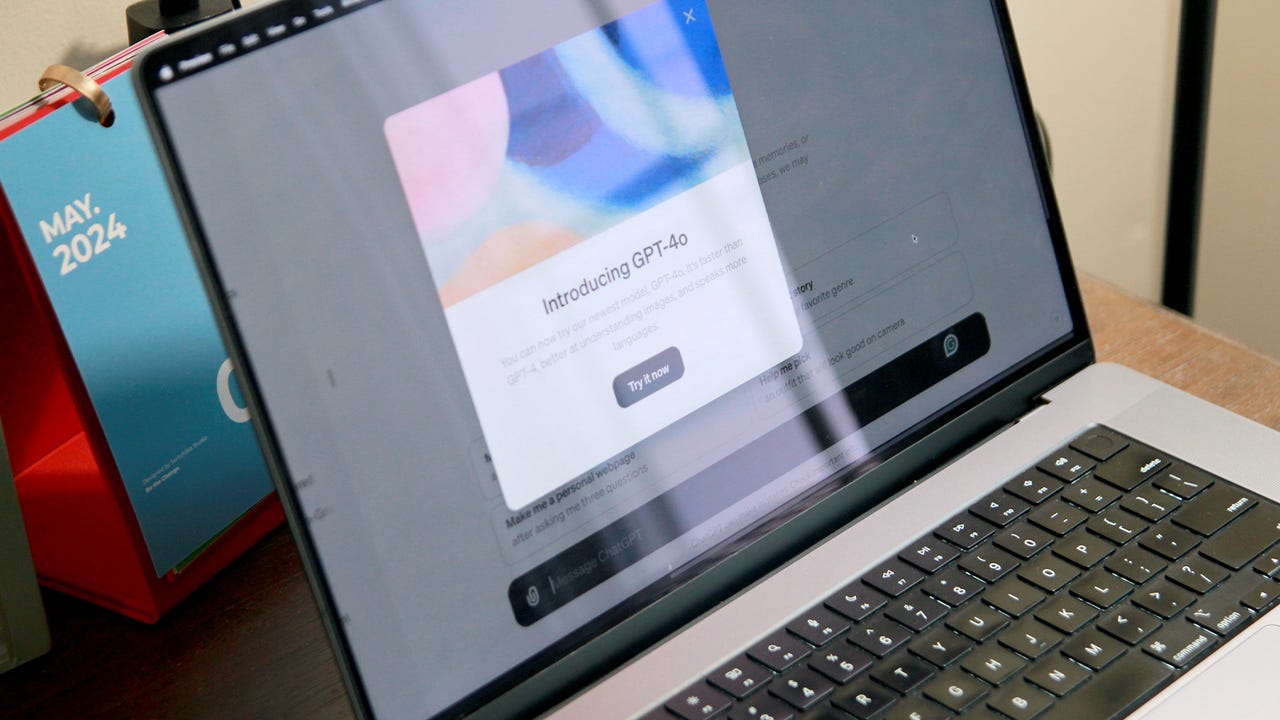
































OpenAI just launched a new ChatGPT app for MacOS, with a Windows app coming later this year. The announcement came alongside a string of new unveilings, including the new GPT-4o model, which will be available for free ChatGPT users, and a new voice mode for Plus users that will include an improved voice feature.
Also: I demoed Google's Project Astra and it felt like the future of generative AI (until it didn't)
While most ChatGPT users will have to wait weeks to see many of these updates, the desktop app for MacOS is available to use right now for Plus subscribers, with OpenAI planning access for all users in the coming months. The MacOS app features a fast, user-friendly interface that sets itself apart from others with its simplicity. Here's what makes it even more helpful: You can access it anytime with a keyboard shortcut.
When using the ChatGPT desktop app, pressing Option + Space Bar pulls up a text bar to enter a prompt, no matter what app you use.
What you need: To use the ChatGPT app, you need an OpenAI account with a ChatGPT Plus subscription and a MacBook or Mac desktop computer with MacOS 14 and Apple Silicon (M1 or better).
The MacOS ChatGPT app is initially available for Plus subscribers, with OpenAI planning to expand access for all users over the coming months. Currently, the ChatGPT app isn't listed in the Mac App Store, so searching for it there will reveal several independent apps and copycats that may not perform like the original.
Also: 6 ways OpenAI just supercharged ChatGPT for free users
To download the official ChatGPT app for MacOS, log in to the ChatGPT website. If you have a ChatGPT Plus subscription, a pop-up will prompt you to download the app.
Once you download the ChatGPT app on your Mac, it's time to begin the installation process. After installation, drop the downloaded app into your Applications.
Once you've installed the ChatGPT app, open it and log in with your ChatGPT Plus subscription credentials.
After you open the ChatGPT app, you can use the Option + Space Bar shortcut to access the AI chatbot from any app you happen to be using.
This is, by far, the most useful feature I've found on the desktop app, one that beats my ChatGPT Siri shortcut out of the water. As a writer, I can easily use ChatGPT to list synonyms when I'm stumped on a word or to define a term while I'm reading.
Also: How to use ChatGPT (and what you can use it for)
It's also very similar to the Mac's Spotlight search shortcut. Pressing Command + Space Bar opens a search bar that searches the computer and web for anything you enter, including apps like Maps, Photos, and Dictionary.
Pressing Option + Space Bar opens a text bar over any window you're in. You can enter your prompt here and then press Enter to submit it. This will open the ChatGPT window with the bot's response. The Opt+Space shortcut isn't accessible after you quit the ChatGPT app.
OpenAI hasn't released a ChatGPT desktop app for Windows. Instead, the company is taking the same approach it pursued with its mobile app, which was launched for iOS before being released in an Android version. The ChatGPT desktop app for Windows will be available later this year.
Also: ChatGPT vs. ChatGPT Plus: Is a paid subscription still worth it?
The ChatGPT desktop app appears to have the same capabilities as the web version. Although you'll encounter a simplified user interface, you can switch easily between GPT-3.5, GPT-4, and GPT-4o just as you do on the website. The sidebar doesn't appear by default, but clicking the sidebar icon at the top of the screen makes it visible. The desktop app lets you upload files and images, have voice conversations, and ask for AI-generated images.
Also: The 4 biggest Google Search features announced at Google I/O 2024
It will be -- eventually. The new Voice Mode that OpenAI demoed during its Spring Update event isn't widely available yet. The company plans to roll it out gradually, beginning with ChatGPT Plus subscribers, who have priority access to new features as part of their subscription perks.
Also: This subtle (but useful) AI feature was my favorite Google I/O 2024 announcement
ChatGPT's new Voice Mode will roll out in an alpha version to Plus users over the coming weeks, but OpenAI plans to eventually make it available to all users, free and paid.
 Tags quentes :
Inteligência artificial
Inovação
Mais instruções
Tags quentes :
Inteligência artificial
Inovação
Mais instruções